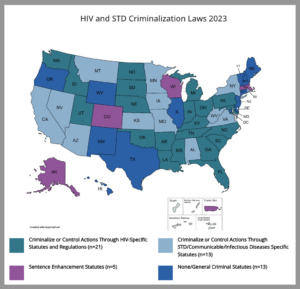On March 23, the city of Nashville settled a federal discrimination lawsuit over barring people living with HIV from serving as police officers. The decision comes amid two ongoing, separate federal lawsuits against the state of Tennessee for discriminating against people with HIV by forcing them to register as sex offenders after being convicted on “aggravated prostitution” charges. Apparently, it would be unjust to deny cops with HIV the chance to criminalize sex workers for having HIV.
The lawsuit against the Metropolitan Nashville Police Department (MNPD) was filed in July 2023, by a former Memphis police officer under the name “John Doe.” He claimed that the department rescinded his job offer after learning his status, even after a medical provider attested to the fact that that Doe’s suppressed viral load meant he could not transmit the virus to others and therefore his HIV did not present any danger to the public. The MNPD paid out a $145,000 settlement for violating the Americans With Disabilities Act (ADA) and updated its civil service policies accordingly.
In October 2023, a different federal lawsuit filed against Tennessee alleged that the state’s “aggravated prostitution” statute violated the ADA by discriminating against people living with HIV. The statute imposes harsher criminal penalties on sex workers if they are known to be living with HIV, making their charge a felony rather than the misdemeanor it is for everyone else. On February 15, following an investigation, the Department of Justice also sued Tennessee for violating the ADA by enforcing the statute.
In the 1980s, many states began passing laws criminalizing people living with HIV. Tennessee, however, is the only state in which people with HIV convicted for engaging in sex work are required to register as “violent sex offenders.” The registry is lifelong.

HIV today is considered a chronic illness, rather than a terminal one. Antiretroviral medications make someone’s viral load undetectable, which means it’s untransmittable to others. This has been widely publicized by the federal U=U campaign.
The fact that someone was taking antiretroviral medication would not have stopped Tennessee from convicting them of “aggravated prostitution.” These laws purport to be about the threat of HIV transmission, but really they criminalize HIV status itself. They don’t require any transmission or even physical contact to have occurred in order for someone to be prosecuted.
The MNPD lawsuit garnered a lot of attention because media is always quick to rush to the defense of cops, and John Doe was a former Memphis “Officer of the Year.”
“There are many concerning aspects of this discriminatory policy but a particular one is the racial aspect,” Jose Abrigo, HIV project director at Lambda Legal, the firm representing John Doe, stated in 2023. “The MNPD’s discriminatory policy clearly has a disproportionate impact on Black people and people of color. Discriminating on the basis of HIV status brings up other potential intersectional issues of race, gender, sexual orientation and, of course, stigma.”
HIV criminalization laws have always disproportionately been wielded against Black people; Brown people; queer people; trans people. Sex offender registries bar people from housing and employment opportunities for the rest of their lives. Nashville has been the site of most of the enforcement of Tennessee’s “aggravated prostitution” statute. There certainly are many concerning aspects of MNPD discriminatory practices, but cops aren’t the ones suffering the most harm.
Top photograph via City of Minneapolis. Inset graphic via Centers for Disease Control and Prevention.




